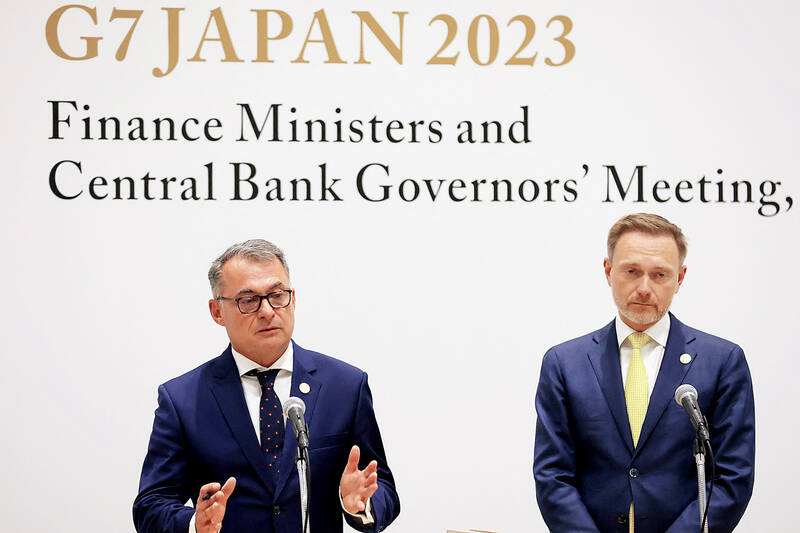Finance ministers from the world’s rich economies could propose a new partnership on supply chains that would be open to other nations, and would require countries to have minimum standards on human rights and environmental policies to join.
Officials are well advanced in drafting a statement for the G7 meeting, with the additional details on diversifying supply chains to be included, people familiar with the matter said.
The planned partnership would start by the end of this year, they said, declining to be named as the drafting is not public.

Photo: REUTERS
Efforts to diversify the supply chain of renewable energy resources is also likely, one person said. China has a dominant position in the supply of some rare earths, and policymakers from around the world have spoken about the need to diversify sources.
Finance ministers and central bank chiefs from the G7 yesterday began a second day of talks in Niigata, Japan, with three hours of closed-door morning talks on global financial stability.
Shoring up supply chains is among the top concerns at the G7 gathering, alongside concerns over the financial sector, the war in Ukraine and debt restructuring.
The G7 finance officers would be looking to show more progress on these issues than is possible in the more disparate G20, which includes China and Russia.
The strengthening of supply chains inevitably has a geopolitical element, given China’s importance in supplying and manufacturing for the global economy. While the US is pushing to reduce reliance on China, some European countries are showing some reluctance.
Speaking in Niigata, European Commissioner for Economy Paolo Gentiloni said that a decoupling from China presents a risk for global commerce.
“What we are talking about is not closing our trade with China, but making our supply chains more secure in some strategic sectors like rare minerals,” Gentiloni said in an interview on the sidelines of the summit. “I think you have to build your own capacity in some of these sectors. This is absolutely needed.”
Yesterday’s talks were to continue through the afternoon, and were to be followed by a dinner. Meetings would resume this morning, with a concluding statement and news conference scheduled for about 12:30pm.
Japan, as this year’s G7 host, invited officials from emerging economies including Brazil and Indonesia to the gathering.
That is a departure from protocol, with the aim to counter China’s growing influence in the so-called Global South.
With recent G20 meetings marred by discord over Russia’s invasion of Ukraine, the G7 has allowed the US and allies to push priorities such as tightening sanctions on Russia and diversifying supply chains from China.
US Secretary of the Treasury Janet Yellen on Thursday said that Washington intends to crack down on Russia’s ability to skirt sanctions imposed by the US and allies after its invasion of Ukraine.
She said she hopes to discuss with her G7 counterparts a set of possible restrictions on outbound investments to China that US President Joe Biden’s administration has been mulling for some time, but has not yet finalized.

The US dollar was trading at NT$29.7 at 10am today on the Taipei Foreign Exchange, as the New Taiwan dollar gained NT$1.364 from the previous close last week. The NT dollar continued to rise today, after surging 3.07 percent on Friday. After opening at NT$30.91, the NT dollar gained more than NT$1 in just 15 minutes, briefly passing the NT$30 mark. Before the US Department of the Treasury's semi-annual currency report came out, expectations that the NT dollar would keep rising were already building. The NT dollar on Friday closed at NT$31.064, up by NT$0.953 — a 3.07 percent single-day gain. Today,

‘SHORT TERM’: The local currency would likely remain strong in the near term, driven by anticipated US trade pressure, capital inflows and expectations of a US Fed rate cut The US dollar is expected to fall below NT$30 in the near term, as traders anticipate increased pressure from Washington for Taiwan to allow the New Taiwan dollar to appreciate, Cathay United Bank (國泰世華銀行) chief economist Lin Chi-chao (林啟超) said. Following a sharp drop in the greenback against the NT dollar on Friday, Lin told the Central News Agency that the local currency is likely to remain strong in the short term, driven in part by market psychology surrounding anticipated US policy pressure. On Friday, the US dollar fell NT$0.953, or 3.07 percent, closing at NT$31.064 — its lowest level since Jan.

The New Taiwan dollar and Taiwanese stocks surged on signs that trade tensions between the world’s top two economies might start easing and as US tech earnings boosted the outlook of the nation’s semiconductor exports. The NT dollar strengthened as much as 3.8 percent versus the US dollar to 30.815, the biggest intraday gain since January 2011, closing at NT$31.064. The benchmark TAIEX jumped 2.73 percent to outperform the region’s equity gauges. Outlook for global trade improved after China said it is assessing possible trade talks with the US, providing a boost for the nation’s currency and shares. As the NT dollar

The Financial Supervisory Commission (FSC) yesterday met with some of the nation’s largest insurance companies as a skyrocketing New Taiwan dollar piles pressure on their hundreds of billions of dollars in US bond investments. The commission has asked some life insurance firms, among the biggest Asian holders of US debt, to discuss how the rapidly strengthening NT dollar has impacted their operations, people familiar with the matter said. The meeting took place as the NT dollar jumped as much as 5 percent yesterday, its biggest intraday gain in more than three decades. The local currency surged as exporters rushed to